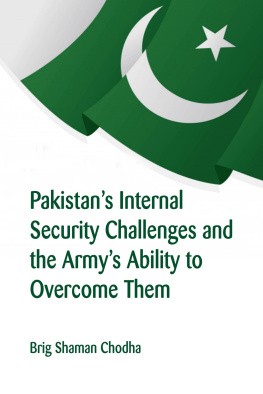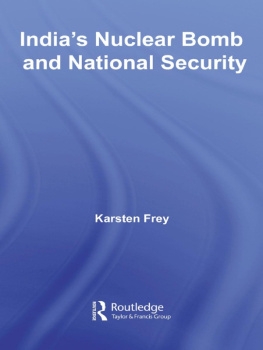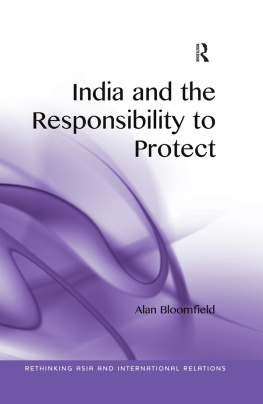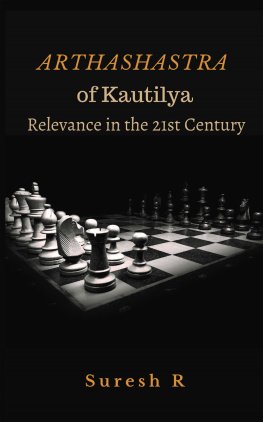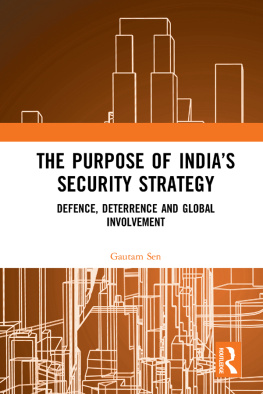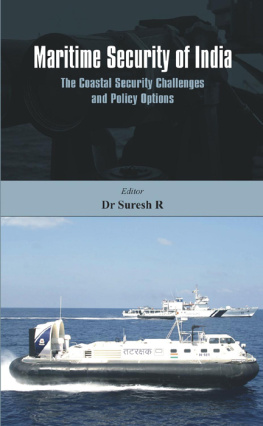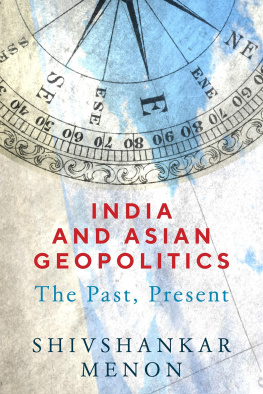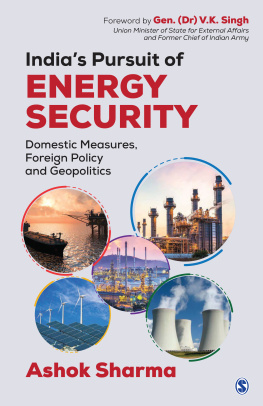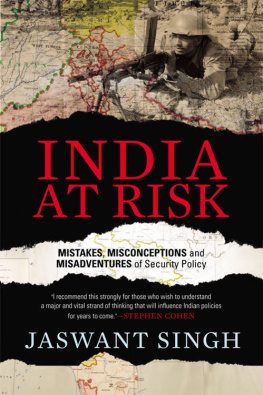Table of Contents
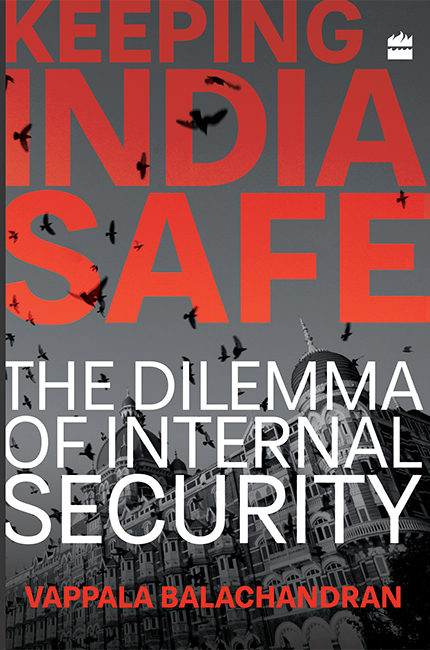
KEEPING INDIA SAFE
THE DILEMMA OF
INTERNAL SECURITY
Vappala Balachandran

To
Sangeeta, Ajoy, Akshay and Anya
CONTENTS
Indias internal security woes are becoming more and more complex and explosive by the day. But there is hardly any awareness about it, and national life moves on from one breaking news to the next. Clearly, issues pertaining to national security, unity and integrity need to be given the highest priority in national discourse. Vappala Balachandrans book does yeoman service in drawing attention to the complex and wide-ranging issues which have been put on the backburner all these years. Importantly, it brings out how they are being dealt with in a number of other countries. But there are no one size fits all solutions. As the experience so far has shown, merely grafting imported policies, practices and procedures does not necessarily work.
Indias Constitution must be given credit for binding together this multi-religious, multi-lingual, multi-racial and multi-cultural country as one nation, decisively disproving many prophets of gloom in India and abroad. In hardly any other developing country are the tenets of parliamentary democracy, secularism and the rule of law so firmly entrenched. Crucial institutions such as the judiciary, the higher civil services, the Election Commission of India, the Human Rights Commission, print and electronic media and statutory regulatory bodies have imparted strength to all national endeavours.
When the Indian Constitution was being framed, many considered India to be only a geographic entity, rather than a nation, comprising, apart from British India, over 550 princely states which had voluntarily merged with India. Such a feat was not achieved anywhere else in the world. The Partition was a horrendous experience and the founding fathers of the Constitution did not want a repetition of it in the future. This was reflected in their persistent efforts to provide for a strong central government. But equally strong was the desire of the provinces for sufficient freedom and autonomy. The overriding concern was to have a Constitution which would be acceptable to all the provinces and diverse sections of society. As a result, several compromises had to be made. These included, among others, police and public order being made a subject in the state list.
Unfortunately, during the last sixty-seven years since the adoption of the Constitution, political one-upmanship has overtaken the sober, mature politics of the freedom struggle. As a result, the political rhetoric of federalism has come in the way of even considerations of national security and unity. This has been seen in the opposition of states to laws for the Central Bureau of Investigation (CBI), the railway police and a federal police force. The enactment of model legislation for Lok Ayuktas is also being opposed. Efforts to enact legislation to deal with serious communal violence and giving the central government a larger role in dealing with such strife have been stymied.
Based on the findings of the four high-level task forces on national security set up by the Government of India after the Kargil War (I was the chairman of the Task Force on Border Management), important recommendations were made by a Group of Ministers and approved by the cabinet to initiate the process of consulting states for amending the Constitution to increase the powers of the central government to deal with extraordinary situations. But these have been languishing since 2002.
I have been suggesting for quite some time that the opposition of states to the passing of central legislation for the CBI could be addressed by setting up a high-level steering committee comprising representatives of the Centre and the states to oversee the functioning of the body. A federal council comprising representatives of the Centre and states being created for policy matters pertaining to the Goods and Services Tax is an innovation which could be replicated for a number of institutions pertaining to internal security.
Dr B.R. Ambedkar, chairman of the drafting committee and then Union law minister, had rightly emphasized in the closing speech of the Constituent Assembly in November 1949: However good a Constitution may be, it is sure to turn out bad because those who are called to work it happen to be a bad lotThe Constitution can provide only the organs of state such as the legislature, the executive and the judiciary. The factors on which the working of those organs of the state depends are the people and the political parties they will set up as their instruments to carry out their wishes and their politics. Who can say how the people of India and their parties will behaveIt is therefore futile to pass any judgment upon the Constitution without reference to the part which the people and their parties are likely to play. How ominously prophetic have been the observations of Ambedkar.
Even without amending the Constitution, a great deal can be achieved if the available instruments of governance are used effectively and apolitically. But the record of premier central agencies such as the CBI and the National Investigation Agency (NIA) has been disappointing, regardless of the political dispensation in power. The police departments of the state governments are also in a shambles. It is shocking that even the directions of the Supreme Courtin the Prakash Singh case (Writ Petition [civil] No. 310 of 1996), issued on 22 September 2006have not been implemented by most states though more than a decade has elapsed. There can be no commentary more eloquent on the state of governance in the country. The grievances and public outcry over the Armed Forces Special Powers Act can be addressed not by an amendment of the Act to dilute the protection for the armed forces but by ensuring that the Act is invoked sparingly and for very short durations.
Shri Balachandran has brought out how the central government made efforts to see that the actions and inactions of its agencies were not probed by the 26/11 inquiry committee. This was no different from the resistance of the Government of India to the probe by the high-level technical committee of experts appointed by the Government of Maharashtra in 2000 to examine how the highly controversial Enron power project, which cast an unsustainable burden on the state, was approved and to suggest ways for dealing with the situation. In that case, the Government of India went to the extent of getting an ex-parte stay from the Supreme Court to the hearings of the judicial commission of inquiry, presided over by a former judge of the Supreme Court, appointed by the Government of Maharashtra. If lessons are not learnt from the monumental mistakes of the past, we are destined to repeat them in the future.
While some woes of internal security stem from gaps in the Constitution, many more are the results of failure of governance, for which only the administrative and political systems are to blame. The agenda of unfinished tasks so comprehensively and lucidly discussed by Shri Balachandran should impel wider and more informed public debates on the subject. In a democracy, there can be no better way of overcoming such woes.
| MADHAV GODBOLE | April 2017 |
| Former Union Home Secretary and Chairman of the Task Force on Border Management set up in 2001 |
In November 1959, a group of forty-two formally dressed eager young men assembled in the central hall of the erstwhile Lawrence School in Mount Abu, a hill station in Rajasthan. They had qualified to be members of the elite Indian Police Service, which had replaced the British-era Imperial Police (IP). Sir Henry Lawrence, former British Resident in Rajputana, had established two schools at Sanawar and Mount Abu in 1847 and 1855 respectively before he was killed in the 1857 uprising. The Mount Abu School was acquired by the Centre in 1948 to house the Central Police Training College to train senior police officers.


